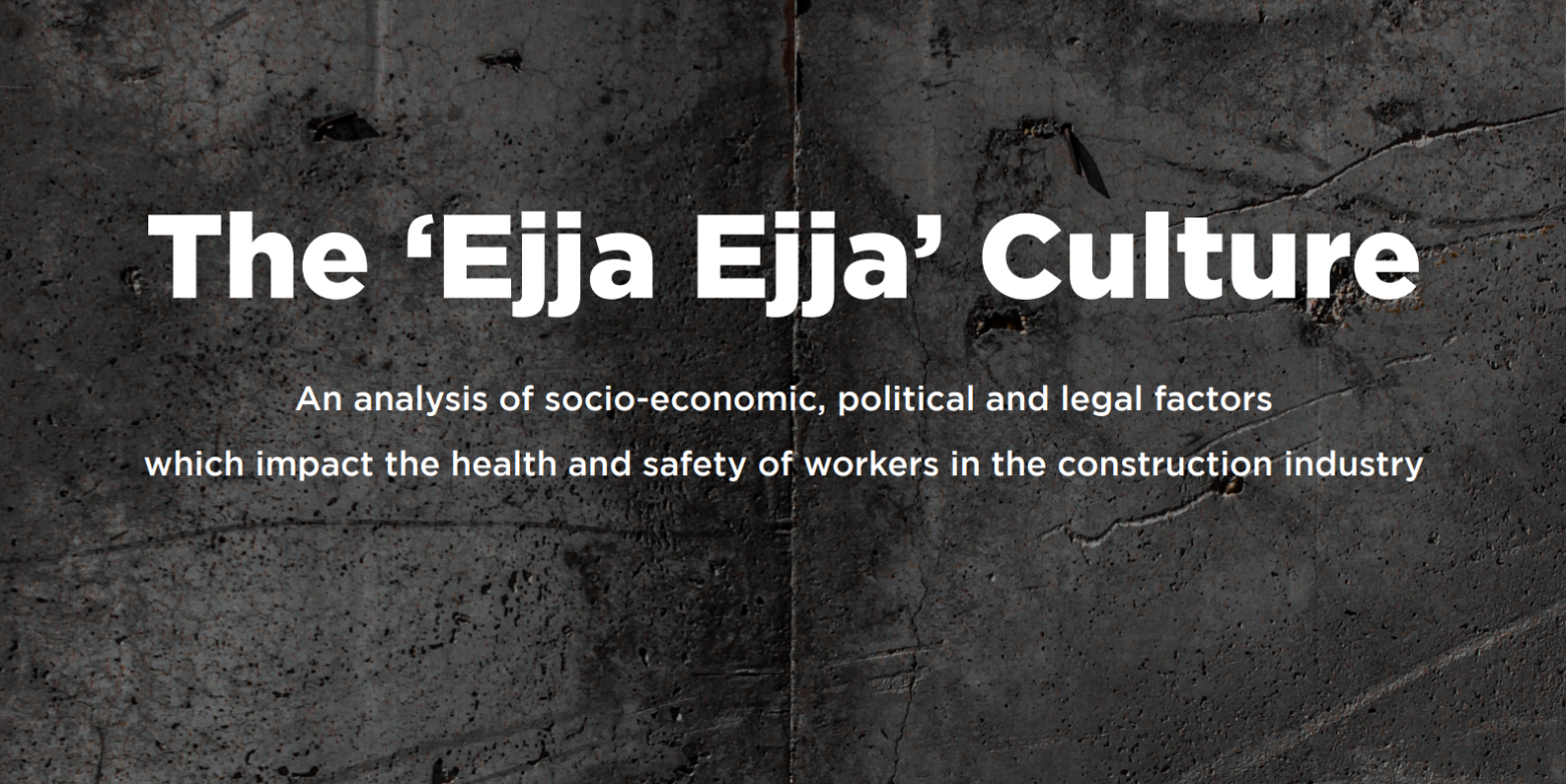The ‘Ejja Ejja’ Culture
An analysis of socio-economic, political and legal factors which impact the health and safety of workers in the construction industry
‘The Ejja Ejja Culture’ is a scientific research study on health and safety in the construction industry published by the Justice and Peace Commission. This research project was initiated in 2022 in response to an increasing number of serious accidents at construction sites. Between 2019 and 2022, 25 construction workers lost their lives. Over 40 interviews with workers, employers, professionals, and organisational representatives in this sector were conducted as part of the study.
One of the main conclusions of this research is that it is unfair and misleading to blame workers for the inherent conditions leading to unsafe environments and increased accident risks. While responsibility for accidents varies on a case-by-case basis, it is evident that the situation is the result of a culture best described as ‘ejja ejja’ (get on with it) which pervades the work in this sector.
The primary objective of ‘The Ejja Ejja Culture’ research project was to identify the main socio-economic, political, and legal factors and influences that may explain the large number of workplace fatalities and injuries in the Maltese construction industry. Even before the collapse of a building in Corradino in December 2022, which claimed the life of a young man, Jean-Paul Sofia, and caused public outrage, the Commission strongly believed that these tragedies could no longer be ignored.
The analysis revealed that workers, especially those at the bottom of the socio-economic pyramid, are not primarily responsible for the numerous legal, socio-economic, and political failings which, together, have created an unsafe ecosystem for construction workers. They are also not the ones benefiting from the fragility in the organisations and institutions meant to protect workers. Unfortunately, they are the ones paying the highest price.
Moreover, the analysis unveiled a clear hierarchy of precariousness, vulnerability, and exploitation. Flaws in the politico-legal set-up and weaknesses in the institutional structures do not impact all workers in the same way. Due to a complex web of factors, migrant workers were identified as the group at the bottom of this hierarchical structure.
Disempowered by the various economic, legal, and wider socio-cultural factors, migrant workers’ effective capacity to take simple steps to protect their safety, such as reporting unsafe work practices to the Occupational Health & Safety Authority (OHSA), approaching a union, or even changing jobs when feeling unsafe, is severely limited. What may seem like normal channels of redress for individuals with citizenship rights, good social and economic capital, knowledge of formal and informal institutional setups, access to the right people, and sufficient language skills, are far from normal and straightforward for those lacking these attributes.
The analysis in the research report, conducted from an Integral Human Development perspective, also underscores an unacceptable mismatch between theory and practice. The enforcement of laws is insufficient and sporadically enforced, and when breaches occur, the penalties clearly fail to serve as an effective deterrent. Consequently, despite the proliferation of rules, regulations, authorities, and duty-holders, impunity prevails.
With no effective deterrent in place to punish those who place their workers’ lives in danger, employers, and developers who, against all odds, decide to adhere to safety regulations —even if it means working at a slower pace and paying whatever is necessary to provide a safe and healthy working environment for their employees— end up at a competitive disadvantage when it comes to pricing and profitability. Unfortunately, this occurs whenever the competent authorities fail to ensure a level and fair playing field that guarantees the right to a safe and healthy work environment for all workers, irrespective of their identity or employer.
Experiences
Recommendations
- Use tax and policy levers to reduce risks associated with unrealistic deadlines.
- Unions should take the lead in advocating for a rights-based approach.
- Provide cultural sensitivity and bias training to all frontline stakeholders.
- Strengthen the provision of health and safety courses and, where necessary, language training.
- Research the effects of machismo culture on health and safety.
- Re-evaluate work permit regulations and immigration laws which disempower migrant workers.
- Increase resources for OHSA and set up one-stop phone number to report all construction-related complaints.
- Make insurance coverage a prerequisite for contractors seeking to be licenced.



